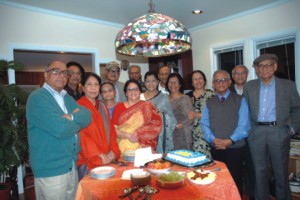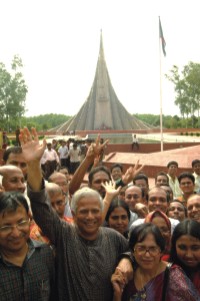| In Retrospect
Euphoria in Bethesda
Azizul Jalil
 |
The Cofee Club members get together to celebrate |
Like people back home, Bangladeshis abroad were euphoric about the Nobel Prize for Professor Yunus and the Grameen Bank. Belying the odium attached to the number 13, it became instantly a red-letter day in the minds of all Bangladeshis, be they at home or abroad.
My telephone started ringing and emails from friends started to come from the early morning of October 13. It took a few minutes to realise the dizzy heights that we had climbed, both as individuals and as a country. I felt, like many others, as if I had personally achieved this rare honour. The next thing was to share with friends this wonderful news for Bangladesh. So we, the Coffee Club members, arranged within hours to meet at a special Nobel Prize session at the Montgomery Mall in Bethesda, Maryland.
People came in a spirit of gratefulness, and with high hopes for a new Bangladesh. We discussed the reasons given in the Nobel Committee's citation for the 2006 Peace Prize and beyond. I definitely felt, as President Clinton later said, that it was long overdue. Some of us were reading beyond the Nobel Committee's acknowledged role of micro credit in transforming the lives of the poor people and the empowerment of rural women. To me, the greatest philosophical significance of the award this year would have to be the recognition of the linkage between poverty and peace, both domestic and international. As Dr. Yunus had explained, without the eradication of poverty there can be no lasting peace anywhere. My opinion was that this belated recognition of the obvious by the international community is likely to have a major impact on the formulation of policies for the settlement of disputes around the world. Additionally, I felt that the Peace Prize would have a beneficial effect on the country's politics. People would no longer tolerate pettiness, use of uncivil language in political discourse, and resort to violence in settling political disputes. A few friends did not share such optimism.
 |
| Dr. Yunus with his wife, friends and well-wishers after announcement of the Nobel Peace Prize. |
One coffee meeting did not satisfy our need to be together at this special time. We felt the urge for endlessly soaking ourselves with the joy of this event, which we took to be a prize recognizing the progress of Bangladesh, despite the patronizing treatment and ridicule of the world. My wife and I were truly honoured that our friends had agreed to meet at a celebratory dinner at our house. It was so far away from the BangladeshChina Friendship Centre in Sher-e-Bangla Nagar in Dhaka at which the Dhaka 'nagorik' were meeting in a mass reception honouring Dr. Yunus. In the next two days, my wife and I conjured up a plan for a private function befitting the observance of a great occasion and not just the usual dining and chatting.
On October 16, the guests arrived at our house in a happy mood, perhaps with a victorious smile on their faces. We had placed a large bouquet of flowers-Mums, white in colour, on the centre table in the living room to signify peace. Two large fragrant candles in the entry foyer emitted a bluish light to create an ambience fit for the occasion. A computer, which had recorded Voice of America (VOA) interviews of three 'probashi' Bangladeshis concerning their reactions to the Nobel Peace Award, was also set up. Appropriate drinks with the right glasses were ready to toast to Professor Yunus and his achievements. We were aware that it was for working for the poor in rural Bangladesh and elsewhere in the world that he had been recognized. Our rather 'bourgeois' style was obviously not in consonance with that spirit, but we were where we were and perhaps entitled to some latitude in freely observing the day.
After a brief introduction by the host about the significance of the award in terms of dealing with the root causes of poverty and discrimination in the context of national and international discords, the following toast was proposed: To Professor Yunus-one of the greatest sons of Bangladesh and indeed, of the world. On this cue, everyone stood up and joyfully cheered 'hip hip hurray' three times. Considering the fact that, by any definition, all of us were senior citizens, for a moment, I reflected on our suddenly regaining the enthusiasm of youthful years. Perhaps that is what the elixir of a Nobel Prize does to old veins!
The people at the VOA's Bangla Service in Washington usually demonstrate a high degree of attachment and devotion to the country. This time for the Nobel Peace Prize, they covered the events at home and abroad with great professionalism. As arranged, the VOA interviews of Washington Bangladeshis, including the author of this piece, on the morning following the announcement, was played at our get-together. The booming voices of the speakers made a great impact on the captive audience and further inspired them with a sense of national pride and glory. A kabab-paratha dinner was followed by the cutting of a cake, with Nobel Peace Prize and Dr. Yunus' name on it. Next item was taking of pictures of the participants to commemorate the happy occasion. We then watched on Dhaka TV channels, a few recorded items on the celebratory functions in Dhaka. In-depth discussions regarding the prospects of Bangladesh in the post-Nobel era continued until late in the night.
We brought our little ceremony of joy to a satisfying close by articulating a desire for more such glories for the nation in the future, and a prayer for an everlasting Bangladesh.
Azizul Jalil writes from Washington.
Copyright
(R) thedailystar.net 2006 |
